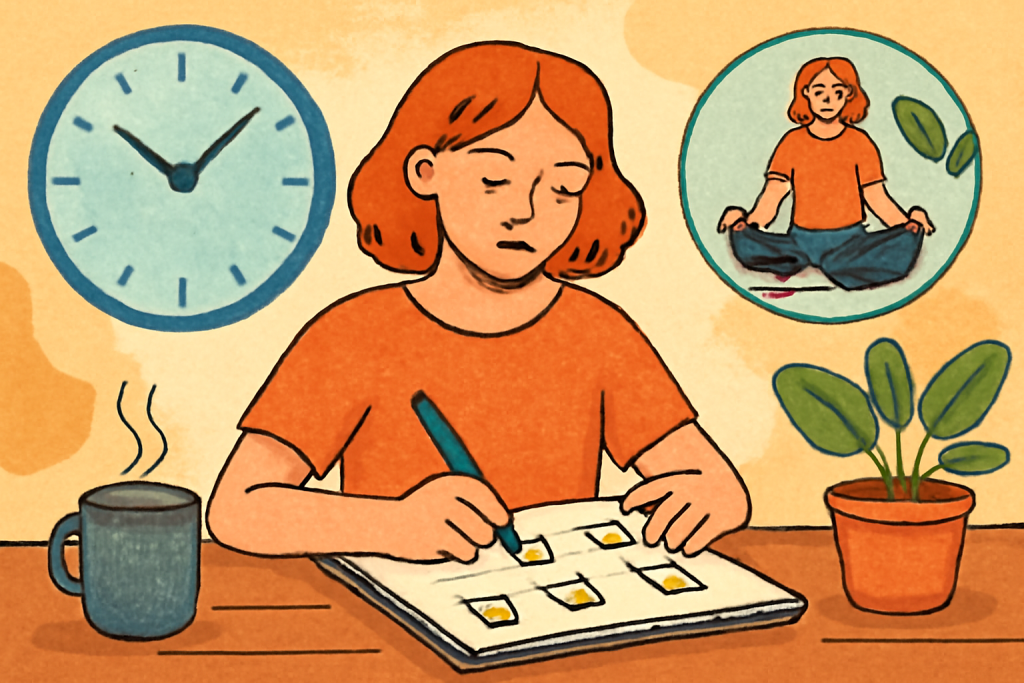The importance of mental health cannot be overstated. Many of us are constantly battling stress, anxiety, and other emotional challenges that can make navigating everyday life seem overwhelming. However, amidst all the chaos, one simple yet powerful tool has been gaining attention for its mental health benefits: routine. But what if incorporating a routine into your daily life could be the secret weapon to achieving greater mental clarity, reducing anxiety, and improving overall well-being? Here’s a deep dive into the hidden mental health benefits of establishing a structured routine.

The Rise of Routine as a Mental Health Strategy
In a society that is increasingly embracing mindfulness, self-care, and holistic approaches to mental health, routine has emerged as an unlikely hero. While we often associate routines with productivity and discipline, they can also offer psychological relief in a world where unpredictability and uncertainty rule. A routine doesn’t just streamline your day—it can directly affect your mind and emotions, providing a sense of security, reducing stress, and improving mood regulation. In fact, research has suggested that the simple act of following a predictable pattern each day has profound psychological benefits.
How Routines Promote Mental Wellness
1. A Sense of Control in an Unpredictable World
For many people, one of the major stressors is a sense of lack of control. From unexpected work demands to personal challenges, life often feels unpredictable. Routines help mitigate this by providing structure in the day. When you know what to expect from your morning or evening, it can create a mental space where your brain feels more relaxed and at ease. This predictability helps anchor you, making the chaos outside feel more manageable.
- Example: Starting the day with a simple morning routine—whether it’s stretching, meditation, or having a healthy breakfast—sets the tone for the rest of your day and provides an immediate sense of stability and grounding.
2. Reduced Anxiety Through Predictability
When you follow a routine, it decreases the mental energy spent on decision-making throughout the day. This can significantly lower anxiety, as you no longer need to worry about what to do next. By streamlining your tasks into a structured plan, the sense of overwhelm that comes from making constant choices is reduced, leading to greater calm and focus.
- Evidence: Studies have shown that individuals with anxiety often experience less stress when they stick to a routine. Predictability helps reduce cognitive overload, which can be a major trigger for anxiety.
3. The Power of Habit for Mental Health
Routines are essentially a series of habits that you repeatedly perform. Habits, particularly positive ones, are beneficial because they bypass the need for constant cognitive effort. Once a habit is formed, it requires less energy to perform. This can make managing your mental health much easier, as you don’t have to constantly remind yourself to take action. For example, incorporating a regular exercise routine can boost endorphin levels—your body’s natural mood lifters—helping you stay emotionally balanced.
- Insight: Developing healthy habits through routine creates a proactive approach to mental health. Whether it’s taking regular breaks, eating nutritious meals, or getting adequate sleep, these routines help you take control of your well-being.
4. Routines as a Reflection of Self-Care
Self-care is not just about luxurious spa days or occasional indulgences. It’s about consistently showing up for yourself every day, and a routine is the perfect way to integrate that into your life. Establishing time for mental health practices—like journaling, mindfulness, or deep breathing—every day reinforces the message that you matter. These practices not only improve your well-being but also contribute to a more balanced emotional state.
- Example: Simply setting aside time in your daily routine for gratitude exercises or self-reflection can help shift your mindset towards positivity, which over time contributes to a healthier outlook on life.
5. Mental Resilience through Structure
A well-structured routine can build mental resilience. As you stick to your routine, you develop the ability to handle challenges with greater ease. When life throws curveballs, a well-established routine can be a stable anchor, helping you stay grounded even in difficult circumstances.
- Research Insight: According to a study published in the Journal of Psychosomatic Research, people who maintain consistent routines report a higher sense of life satisfaction and emotional resilience.
Practical Tips for Establishing a Mental Health-Boosting Routine
While the benefits of routine are clear, getting started may feel overwhelming. Here are a few tips to help you integrate a routine into your life for better mental health:
1. Start Small
Rather than completely overhauling your day, start with a small, manageable routine. Pick one or two activities—like drinking a glass of water first thing in the morning or journaling for five minutes before bed—and gradually build from there.
2. Prioritize Self-Care
Incorporate self-care practices like mindfulness, journaling, or light exercise into your daily schedule. Making these a priority can help you feel grounded and emotionally balanced.
3. Create Flexible Routines
Life can be unpredictable, and it’s important to maintain flexibility in your routine. This way, if you can’t follow everything to the letter one day, you won’t feel like you’ve failed. The goal is to create structure, not perfection.
4. Incorporate Breaks
Mental health is closely linked to the ability to rest. Make sure your routine includes regular breaks throughout the day. Step outside, take a short walk, or simply close your eyes for a few minutes to reset. These small moments of rest can help reduce burnout.
5. Make It Consistent
Consistency is key when building a routine. Try to stick to the same activities at the same times each day. Over time, your brain will begin to associate these actions with feelings of stability and calm.
Conclusion: Routine as a Powerful Mental Health Tool
The mental health benefits of routine are often overlooked, but they play a crucial role in maintaining emotional and psychological well-being. A structured day can provide a sense of control, reduce anxiety, and foster the development of positive habits. By creating small but consistent routines, you can tap into these benefits and improve your mental health in meaningful ways. So, if you’re struggling with stress or anxiety, consider how a simple routine might be the key to finding balance and calm in your daily life.
References
Moise, L. et al. (2020) ‘New immunoinformatics tools for swine: designing epitope-driven vaccines predicting vaccine efficacy and making vaccines on demand’ Frontiers in Immunology, 11 article number 563362. Available at: https://doi.org/10.3389/fimmu.2020.563362 (Accessed: 2 May 2021).
World Health Organization. (2020) Salt reduction. Available at: https://www.who.int/news-room/fact-sheets/detail/salt-reduction (Accessed: 24 June 2021).
Thomas, D. and Tian, L. (2021) ‘Hits from the Bong: the impact of recreational marijuana dispensaries on property values’ Regional Science and Urban Economics, 87 article number 103655. Available at: https://doi.org/10.1016/j.regsciurbeco.2021.103655 (Accessed: 10 April 2021).









